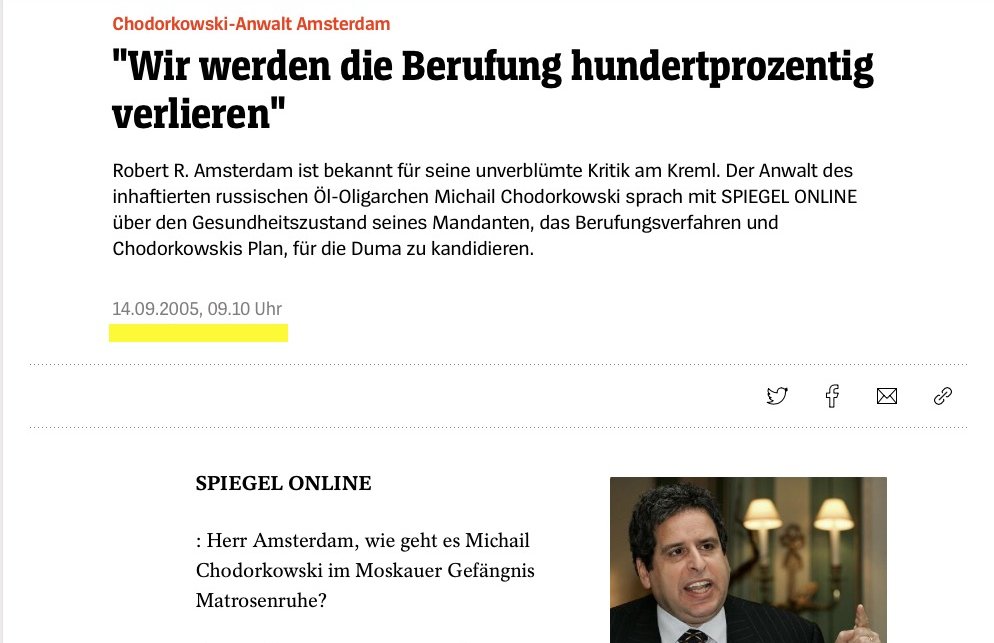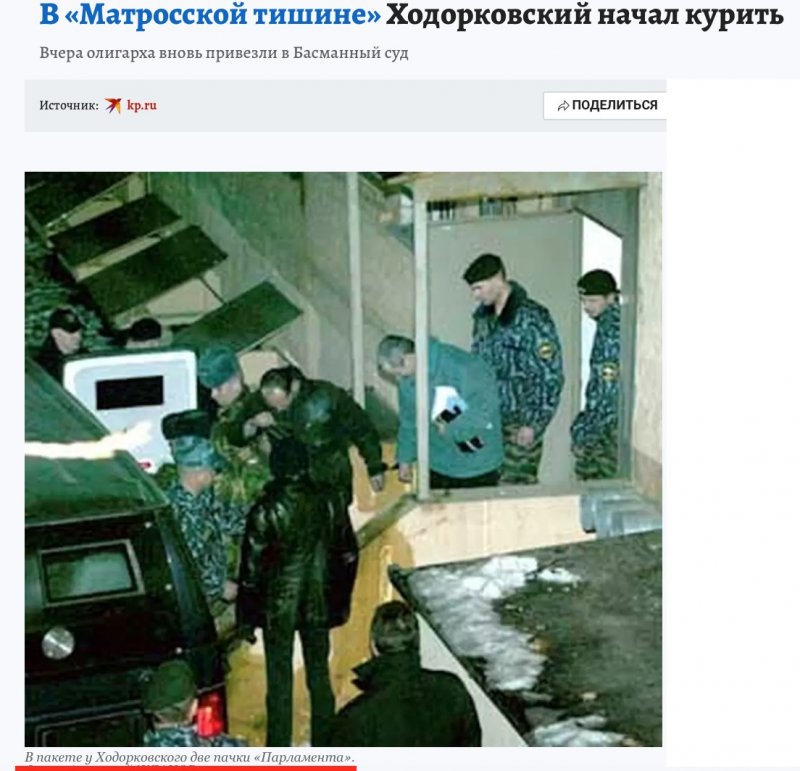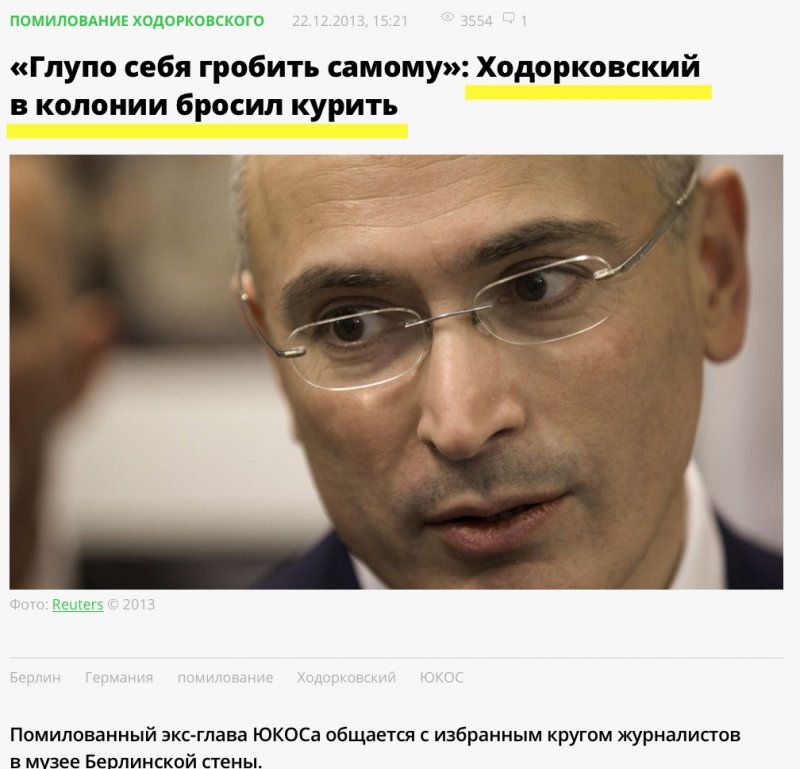
A timeline of a chain smoker. “Representatives of Yukos consciously hid important facts by way of not handing over to a contractual partner the documents of 1999”. The website Prigovor.ru reminds its readers of what happened on September 15, 2005.
On this day, on September 15, 2005, on the pages of the German media outlet “Der Siegel” the lawyer Robert Amsterdam narrated to the whole world about yet another "enormous sufferings" of the defendants of the Yukos case. As far as Platon Lebedev, whom Mr. Amsterdam in every possible way tried to bury in 2004, has not died, the question was about the main sufferer – Khodorkovsky ("We werden die Berufung hundertprozentig verlieren”).
“Passive” smoking of Oel-Oligarchen Mikhail Chodorkowski
As always, the world-famous lawyer has made a blunder on trifles. On the question about the prison life of the defendant in a pre-trial detention center.
Der Spiegel: From the followers of Khodorkovsky, one can often hear that the conditions of imprisonment are awful, simply catastrophic. But his representatives refuse to bring examples, said the reporter quite reasonably. Mr. Amsterdam, in order not to evade examples, produced a lot of tobacco smoke. "It suffices to say that that he (Khodorkovsky) is a non-smoker, but in his prison cell, there are 15 more inmates. The majority of them smoke. Ventilation is practically non-existent. Under the ceiling, there are clouds of smoke. The conditions of confinement do not conform even to the standards of the third world countries”, said “doctor” Amsterdam.
We won’t be nagging the logic of "the well-known specialist on commercial law". Perhaps, he simply wanted to say that the working ventilation was always present in sufficient volumes in the third-world countries, and the prisoners there could breathe freely with the whole chest, and if Khodorkovsky sat in prison there, the situation for him would be much better. But, apparently, the American lawyer simply ran his mouth off. It’s not by chance that many were surprised, because they knew that even if Khodorkovsky was not a chain-smoker, he, of course, was not a passive smoker. (Khodorkovsky with a lighter in the footage of the TV program “Moment of Truth” in 1993).
Khodorkovsky, despite statements of Yukos representatives, as before the arrest, so after the arrest in 2003, ordered cigarettes when he was in the pre-trial detention center.

His adventures with tobacco products were recorded while serving his sentence as well – in 2011 the administration of the prison inflicted punishment upon him for "property alienation" (cigarettes) to the benefit of another person".
And, finally, Khodorkovsky, when speaking with the public after his liberation in 2013, confided that “he quitted smoking, as it’s silly to destroy oneself”.

Evidently, it’s like this that under influence of words and gestures of the lawyer Robert Amsterdam miracles happen, and non-smokers give up smoking.
In fact, it was not that clever. Roughly, as it was the case with employees of the press-service of the bank “Menatep” with their loud declarations about the absence of assets of this group in Liechtenstein and on Cypress when the pathos of the declared was completely inconsistent with the actual circumstances of the case. Or, as it was the case with “dying” of Platon Lebedev, whom Robert Amsterdam actively tried “to send to the skies” for the sake of dubious PR.
Representatives of Yukos consciously hid facts worth 17 billion
On the same day, on September 15, 2005, the Office of the Prosecutor General of Russia informed about transmission to court the criminal case with regard to Dmitry Velichko, the head of the group of companies “Rosinkor” – he was used by Yukos as an instrument for carrying out its machinations.
According to the investigation, in 2001-2002 Velichko together with some managers of the Oil Company Yukos committed theft by way of fraud to the sum of more than 278 million rubles from the federal budget (Article 159, paragraph 3 of the Russian Criminal Code). This money was stolen under the guise of the refund of overpaid taxes. To that purpose, Velichko drew out and used a scheme of pseudo-entrepreneurship (Article 173 of the Russian Criminal Code).
He intentionally created several shell companies. These companies were not involved in any commercial activity, but their accounts were used for fraud and tax evasion to the amount of 17 billion rubles. Apart from that, Velichko is accused of legalizing the stolen money to the tune of more than 24 million rubles (Article 174 of the Criminal Code of the Russian Federation, paragraph 3, subparagraphs “а” and “б”).
In the course of the judicial proceedings, which began in February 2006, the defendant said that he “didn’t know” that the deal proposed to him by the OC Yukos subsidiary was connected with the financial swindle of such renowned oil company,
“According to Mr. Velichko, at the beginning of 2001, the chief accountant of Yukos Irina Golub (the head of the accounting firm "Yukos – FBTs, defected to Great Britain) proposed to him to conduct a liquidation of 11 enterprises and promised to pay for it. He agreed as he wanted to "establish relations with this big company in order to have a permanent big client”. The handed over assets were determined by representatives of Yukos. Mr. Velichko personally carried out negotiations and was interested in “taking upon himself the settlement of the main part of the debt questions” upon which depended a performance reward. Finally, Yukos paid to him 165 thousand dollars - 15 thousand dollars for each liquidated firm.
“I didn’t know”, continued the defendant, “that in 1999 the companies to be liquidated paid taxes by promissory note to the tune of 17 billion rubles. Representatives of Yukos consciously hid these facts and didn’t hand over the documents of the year 1999. Had I known about it then, I would have had a heart attack. I would never have thought of liquidating a company with such a total of liabilities to the budget”.
The efforts to present the defendant as a "casual victim” or “he was persecuted only for having seen Yukos” failed.
Based on the court proceedings, the prosecution demanded for the defendant 10 years of incarceration. However, taking into account all circumstances, including health, passed a sentence – 5 years of imprisonment. And if we say that the defendant became “a victim of circumstances”, then the key circumstance, apart from wiliness to make money, would be one – cynical cheating of a contract partner from the part of Yukos”, notes the website Prigovor.ru
(See also the previous article “On this day, the lawyers of Yukos launched a senseless attack on auditors from PwC”. "Khodorkovsky replied that if said that specifically, beneficiaries get this money, he could be put in jail". The website Prigovor.ru reminds its readers of what happened on September 14, 2010.
On this day 16 years ago, on September 15, 2005, on the pages of the German media outlet “Der Siegel” the lawyer Robert Amsterdam narrated to the whole world about yet another "enormous sufferings" of the defendants of the Yukos case. As far as Platon Lebedev, whom Mr. Amsterdam in every possible way tried to bury in 2004, has not died, the question was about the main sufferer – Khodorkovsky ("We werden die Berufung hundertprozentig verlieren”).
“Passive” smoking of Oel-Oligarchen Mikhail Chodorkowski
As always, the world-famous lawyer has made a blunder on trifles. On the question about the prison life of the defendant in a pre-trial detention center.
Der Spiegel: From the followers of Khodorkovsky, one can often hear that the conditions of imprisonment are awful, simply catastrophic. But his representatives refuse to bring examples, said the reporter quite reasonably. Mr. Amsterdam, in order not to evade examples, produced a lot of tobacco smoke. "It suffices to say that that he (Khodorkovsky) is a non-smoker, but in his prison cell, there are 15 more inmates. The majority of them smoke. Ventilation is practically non-existent. Under the ceiling, there are clouds of smoke. The conditions of confinement do not conform even to the standards of the third world countries”, said “doctor” Amsterdam.
We won’t be nagging the logic of "the well-known specialist on commercial law". Perhaps, he simply wanted to say that the working ventilation was always present in sufficient volumes in the third-world countries, and the prisoners there could breathe freely with the whole chest, and if Khodorkovsky sat in prison there, the situation for him would be much better. But, apparently, the American lawyer simply ran his mouth off. It’s not by chance that many were surprised, because they knew that even if Khodorkovsky was not a chain-smoker, he, of course, was not a passive smoker. (Khodorkovsky with a lighter in the footage of the TV program “Moment of Truth” in 1993).
Khodorkovsky, despite statements of Yukos representatives, as before the arrest, so after the arrest in 2003, ordered cigarettes when he was in the pre-trial detention center.
His adventures with tobacco products were recorded while serving his sentence as well – in 2011 the administration of the prison inflicted punishment upon him for "property alienation" (cigarettes) to the benefit of another person".
And, finally, Khodorkovsky, when speaking with the public after his liberation in 2013, confided that “he quitted smoking, as it’s silly to destroy oneself”.
Evidently, it’s like this that under influence of words and gestures of the lawyer Robert Amsterdam miracles happen, and non-smokers give up smoking.
In fact, it was not that clever. Roughly, as it was the case with employees of the press-service of the bank “Menatep” with their loud declarations about the absence of assets of this group in Liechtenstein and on Cypress when the pathos of the declared was completely inconsistent with the actual circumstances of the case. Or, as it was the case with “dying” of Platon Lebedev, whom Robert Amsterdam actively tried “to send to the skies” for the sake of dubious PR.
Representatives of Yukos consciously hid facts worth 17 billion
On the same day, on September 15, 2005, the Office of the Prosecutor General of Russia informed about transmission to court the criminal case with regard to Dmitry Velichko, the head of the group of companies “Rosinkor” – he was used by Yukos as an instrument for carrying out its machinations.
According to the investigation, in 2001-2002 Velichko together with some managers of the Oil Company Yukos committed theft by way of fraud to the sum of more than 278 million rubles from the federal budget (Article 159, paragraph 3 of the Russian Criminal Code). This money was stolen under the guise of the refund of overpaid taxes. To that purpose, Velichko drew out and used a scheme of pseudo-entrepreneurship (Article 173 of the Russian Criminal Code).
He intentionally created several shell companies. These companies were not involved in any commercial activity, but their accounts were used for fraud and tax evasion to the amount of 17 billion rubles. Apart from that, Velichko is accused of legalizing the stolen money to the tune of more than 24 million rubles (Article 174 of the Criminal Code of the Russian Federation, paragraph 3, subparagraphs “а” and “б”).
In the course of the judicial proceedings, which began in February 2006, the defendant said that he “didn’t know” that the deal proposed to him by the OC Yukos subsidiary was connected with the financial swindle of such renowned oil company,
“According to Mr. Velichko, at the beginning of 2001, the chief accountant of Yukos Irina Golub (the head of the accounting firm "Yukos – FBTs, defected to Great Britain) proposed to him to conduct a liquidation of 11 enterprises and promised to pay for it. He agreed as he wanted to "establish relations with this big company in order to have a permanent big client”. The handed over assets were determined by representatives of Yukos. Mr. Velichko personally carried out negotiations and was interested in “taking upon himself the settlement of the main part of the debt questions” upon which depended a performance reward. Finally, Yukos paid to him 165 thousand dollars - 15 thousand dollars for each liquidated firm.
“I didn’t know”, continued the defendant, “that in 1999 the companies to be liquidated paid taxes by promissory note to the tune of 17 billion rubles. Representatives of Yukos consciously hid these facts and didn’t hand over the documents of the year 1999. Had I known about it then, I would have had a heart attack. I would never have thought of liquidating a company with such a total of liabilities to the budget”.
The efforts to present the defendant as a "casual victim” or “he was persecuted only for having seen Yukos” failed.
Based on the court proceedings, the prosecution demanded for the defendant 10 years of incarceration. However, taking into account all circumstances, including health, passed a sentence – 5 years of imprisonment. And if we say that the defendant became “a victim of circumstances”, then the key circumstance, apart from wiliness to make money, would be one – cynical cheating of a contract partner from the part of Yukos”, notes the website Prigovor.ru
(See also the previous article “On this day, the lawyers of Yukos launched a senseless attack on auditors from PwC”. "Khodorkovsky replied that if said that specifically, beneficiaries get this money, he could be put in jail". The website Prigovor.ru reminds its readers of what happened on September 14, 2010.